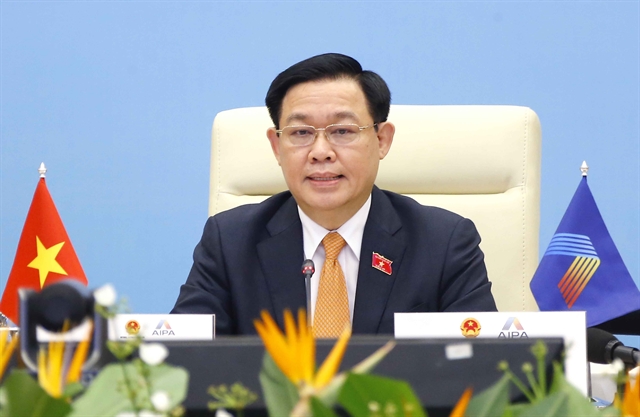 Politics & Law
Politics & Law


|
| National Assembly (NA) chairman Vương Đình Huệ speaks at the 42nd General Assembly of the ASEAN Inter-Parliamentary Assembly. — VNA/VNS Photo |
HÀ NỘI — Despite the effects of the ongoing pandemic and complex, unpredictable shifts in the regional and international geo-political landscape, the ASEAN community has maintained solidarity and upheld its reserve, said Chairman of the National Assembly (NA) Vương Đình Huệ on Monday.
He was addressing the 42nd General Assembly of the ASEAN Inter-Parliamentary Assembly (AIPA-42) which is being virtually held in Brunei.
In the past year, the world and the ASEAN region have faced tremendous difficulties and challenges posed by the pandemic, causing casualties and disruptions in the regional supply chain. This has significantly impacted economic growth and exacerbated social inequality, including digital inequality and social welfare, he said.
More than ever, the pandemic has underscored the urgency of state governance, and adjustments of policies and development goals. It has also emphasised the demand for digitalisation and a digital economy to respond to the pandemic and sustain socio-economic development, he added.
“Our Community has timely exerted collective efforts in response to the pandemic since its outbreak. As we weather tempestuous challenges, the close bonds and mutual sharing among ASEAN members and their peoples are further bolstered,” he said.
Via initiatives such as the ASEAN COVID-19 Response Fund, the Regional Reserve of Medical Supplies and the ASEAN Vaccine Security and Self-Reliance initiative, ASEAN members have worked closely together to strengthen the responsiveness of each country and gradually contain the pandemic, he said.
In tandem with efforts to combat this pandemic, ASEAN is taking measures under the ASEAN Comprehensive Recovery Framework, in which innovation, digitalisation, and the transformation of growth models are considered as drivers to foster a sustainable recovery, he said.
Digital connectivity
The pandemic also constitutes a catalyst for ASEAN’s endeavors to accelerate the digitalisation of its economy, harness the Fourth Industrial Revolution, narrow the digital gap, and ensure digital equality, he said.
“Forging Parliamentary Cooperation in Digital Inclusion towards ASEAN Community 2025” was the theme outlined to build on the role of AIPA and its Member Parliaments in accelerating digitalisation, ensuring stable growth and fostering sustainable recovery of ASEAN, thereby maintaining ASEAN’s key contributions to regional peace, stability and prosperity, the top legislator said.
He made several recommendations:
Firstly, AIPA Member Parliaments need to complete the legal framework and remove barriers to facilitate digital transformation policies, with a view to building e-Government. It is also necessary to improve the quality of online public services of our governments and parliaments, facilitate equitable access to digital services for people and businesses, increase digital literacy for vulnerable groups, and offer fair, equitable and affordable digital services.
Secondly, concrete programmes, action plans and strategies were needed on digital development. It is essential to bolster cooperation with partners and international organisations to improve digital infrastructure, ensure an inclusive digital ecosystem, and narrow the digital gap.
Thirdly, social resources are needed to develop a digital ecosystem via public - private partnership and create incubators to develop digital corporations and start-ups. It is necessary to align the ASEAN Comprehensive Recovery Framework with the plans of each country to assist enterprises in enhancing innovation and digitalisation, thereby ensuring stability and resuming production and business activities.
Fourthly, policies and legal frameworks and support initiatives in the cooperation within ASEAN and between ASEAN and its partners on cyber security, information privacy, and data protection need to be improved.
Experience sharing and cooperation
In response to the pandemic developments, Huệ called on AIPA member parliaments to cooperate and share experience, particularly in science and technology to keep the virus under control.
He proposed enhanced cooperation among AIPA and partners in research, development and sharing of vaccines, medicine and COVID-19 prevention and control equipment.
The NA Chairman noted that despite numerous challenges caused by COVID-19, Việt Nam successfully held the elections for the 15th National Assembly, and the People’s Councils at all levels for the 2021-2026 tenure in May.
In July, the country successfully convened the first session of the 15th NA to elect the key leaderships of the State, NA and Government, and outline the goals to become a modern industrialised developing country, having graduated from the lower-middle income group by 2025, a developing country with a modern industrial base and an upper-middle income by 2030, and a developed, high-income country by 2045, he said.
“The NA of Việt Nam pledges to continue being an active and responsible AIPA member, for the development of parliamentary diplomacy and the interests of all people in ASEAN,” he said.
Dato Lim Jock Hoi, Secretary-General of ASEAN, said at the meeting that ASEAN continued to consolidate itself to become a more inclusive and resilient community in spite of the unprecedented challenges brought about by the COVID-19 pandemic.
As the region’s lead parliamentary organisation, AIPA has significantly contributed to cooperation and development across the three community pillars of ASEAN. Lawmakers from all ten member states gathered at the Assembly to advance priority issues into actionable plans such as agreements and initiatives, and collectively realise a people-oriented, people-centred ASEAN community.
AIPA played a key role in transposing regional commitments to national laws, expediting the ratification of ASEAN agreements, aligning domestic laws with regional priorities, as well as monitoring law implementations across the region, he said. — VNS




